(完整版)高考完形填空练习及解析
- 格式:doc
- 大小:26.88 KB
- 文档页数:6
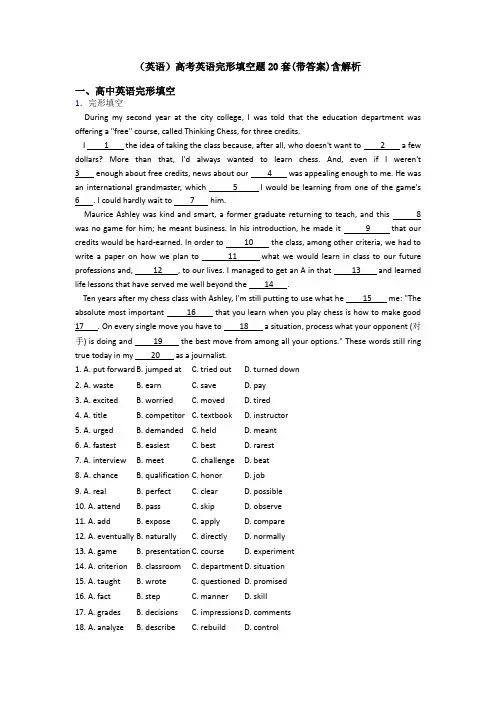
(英语)高考英语完形填空题20套(带答案)含解析一、高中英语完形填空1.完形填空During my second year at the city college, I was told that the education department was offering a "free" course, called Thinking Chess, for three credits.I 1 the idea of taking the class because, after all, who doesn't want to 2 a few dollars? More than that, I'd always wanted to learn chess. And, even if I weren't 3 enough about free credits, news about our 4 was appealing enough to me. He wasan international grandmaster, which 5 I would be learning from one of the game's 6 . I could hardly wait to 7 him.Maurice Ashley was kind and smart, a former graduate returning to teach, and this 8 was no game for him; he meant business. In his introduction, he made it 9 that our credits would be hard-earned. In order to 10 the class, among other criteria, we had to write a paper on how we plan to 11 what we would learn in class to our future professions and, 12 , to our lives. I managed to get an A in that 13 and learnedlife lessons that have served me well beyond the 14 .Ten years after my chess class with Ashley, I'm still putting to use what he 15 me: "The absolute most important 16 that you learn when you play chess is how to make good 17 . On every single move you have to 18 a situation, process what your opponent (对手) is doing and 19 the best move from among all your options." These words still ring true today in my 20 as a journalist.1. A. put forward B. jumped at C. tried out D. turned down2. A. waste B. earn C. save D. pay3. A. excited B. worried C. moved D. tired4. A. title B. competitor C. textbook D. instructor5. A. urged B. demanded C. held D. meant6. A. fastest B. easiest C. best D. rarest7. A. interview B. meet C. challenge D. beat8. A. chance B. qualification C. honor D. job9. A. real B. perfect C. clear D. possible10. A. attend B. pass C. skip D. observe11. A. add B. expose C. apply D. compare12. A. eventually B. naturally C. directly D. normally13. A. game B. presentation C. course D. experiment14. A. criterion B. classroom C. department D. situation15. A. taught B. wrote C. questioned D. promised16. A. fact B. step C. manner D. skill17. A. grades B. decisions C. impressions D. comments18. A. analyze B. describe C. rebuild D. control19. A. announce B. signal C. block D. evaluate20. A. role B. desire C. concern D. behavior【答案】(1)B;(2)C;(3)A;(4)D;(5)D;(6)C;(7)B;(8)D;(9)C;(10)B;(11)C;(12)A;(13)C;(14)B;(15)A;(16)D;(17)B;(18)A;(19)D;(20)A;【解析】【分析】本文是一篇记叙文,作者在大二所学习的免费课程—象棋。
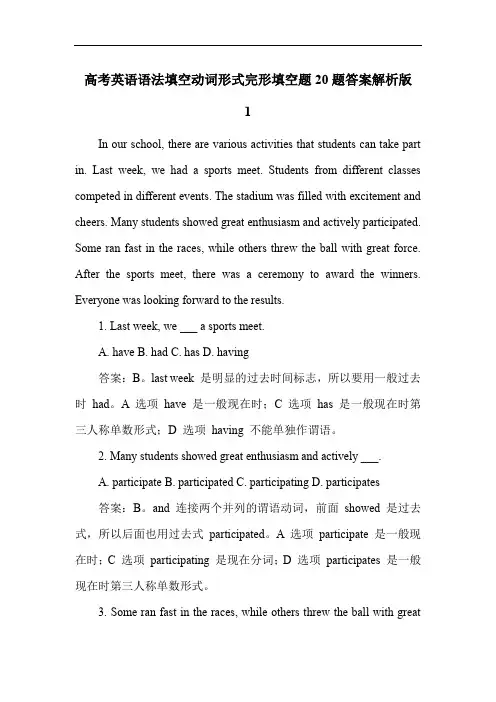
高考英语语法填空动词形式完形填空题20题答案解析版1In our school, there are various activities that students can take part in. Last week, we had a sports meet. Students from different classes competed in different events. The stadium was filled with excitement and cheers. Many students showed great enthusiasm and actively participated. Some ran fast in the races, while others threw the ball with great force. After the sports meet, there was a ceremony to award the winners. Everyone was looking forward to the results.1. Last week, we ___ a sports meet.A. haveB. hadC. hasD. having答案:B。
last week 是明显的过去时间标志,所以要用一般过去时had。
A 选项have 是一般现在时;C 选项has 是一般现在时第三人称单数形式;D 选项having 不能单独作谓语。
2. Many students showed great enthusiasm and actively ___.A. participateB. participatedC. participatingD. participates答案:B。
and 连接两个并列的谓语动词,前面showed 是过去式,所以后面也用过去式participated。
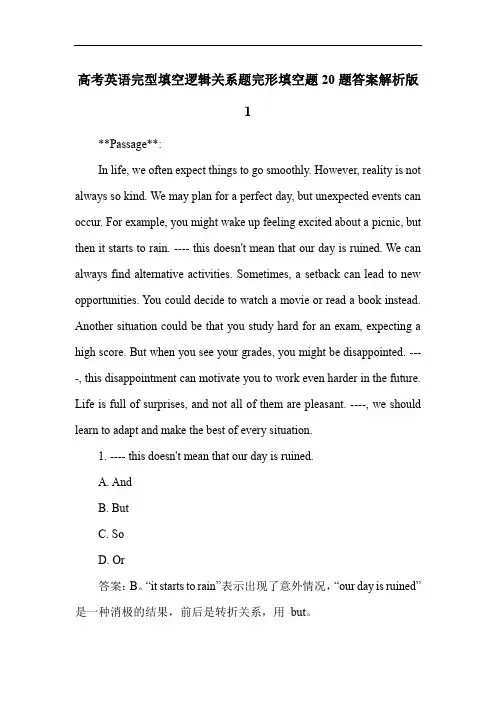
高考英语完型填空逻辑关系题完形填空题20题答案解析版1**Passage**:In life, we often expect things to go smoothly. However, reality is not always so kind. We may plan for a perfect day, but unexpected events can occur. For example, you might wake up feeling excited about a picnic, but then it starts to rain. ---- this doesn't mean that our day is ruined. We can always find alternative activities. Sometimes, a setback can lead to new opportunities. You could decide to watch a movie or read a book instead. Another situation could be that you study hard for an exam, expecting a high score. But when you see your grades, you might be disappointed. ----, this disappointment can motivate you to work even harder in the future. Life is full of surprises, and not all of them are pleasant. ----, we should learn to adapt and make the best of every situation.1. ---- this doesn't mean that our day is ruined.A. AndB. ButC. SoD. Or答案:B。
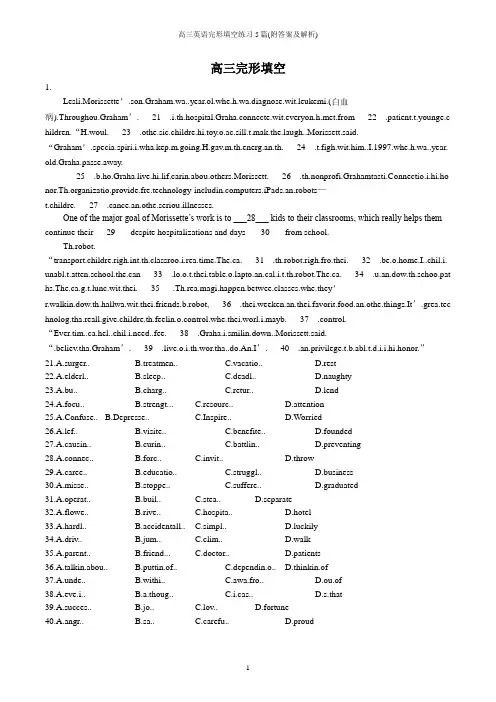
高三完形填空1.Lesli.Morissette’.son.Graham.wa..year.ol.whe.h.wa.diagnose.wit.leukemi.(白血病).Throughou.Graham’.___21__.i.th.hospital.Graha.connecte.wit.everyon.h.met.from___22__.patient.t.younge.c hildren.“H.woul.___23__ugh..Morissett.said.“Graham’.specia.spiri.i.wha.kep.m.going.H.gav.m.th.energ.an.th.___24__.t.figh.wit.him..I.1997.whe.h.wa..year. old.Graha.passe.away.___25__.b.ho.Graha.live.hi.lif.carin.abou.others.Morissett.___26__.th.nonprofi.Grahamtasti.Connectio.i.hi.ho puters.iPads.an.robots—t.childre.___27__.cance.an.othe.seriou.illnesses.One of the major goal of Morissette’s work is to ___28___ kids to their classrooms, which really helps them continue their___29___ despite hospitalizations and days ___30___ from school.Th.robot.“transport.childre.righ.int.th.classroo.i.rea.time.The.ca.___31__.th.robot.righ.fro.thei.___32__.be.o.home.I..chil.i. unabl.t.atten.school.the.can___33__pto.an.cal.i.t.th.robot.The.ca.___34__.u.an.dow.th.schoo.pat hs.The.ca.g.t.lunc.wit.thei.___35___.Th.rea.magi.happen.betwee.classes.whe.they’r.walkin.dow.th.hallwa.wit.thei.friends.b.robot,___36__.thei.weeken.an.thei.favorit.food.an.othe.things.It’.grea.tec hnolog.tha.reall.give.childre.th.feelin.o.control.whe.thei.worl.i.mayb.___37__.control.“Ever.tim..ca.hel..chil.i.need..fee.___38__.Graha.i.smilin.down..Morissett.said.“.believ.tha.Graham’.___39__.live.o.i.th.wor.tha..do.An.I’.___40__.an.privilege.t.b.abl.t.d.i.i.hi.honor.”21.A.surger.. B.treatmen.. C.vacatio.. D.rest22.A.elderl.. B.sleep.. C.deadl.. D.naughty23.A.bu.. B.charg.. C.retur.. D.lend24.A.focu.. B.strengt... C.resourc.. D.attention25.A.Confuse.. B.Depresse.. C.Inspire.. D.Worried26.A.lef.. B.visite.. C.benefite.. D.founded27.A.causin.. B.curin.. C.battlin.. D.preventing28.A.connec.. B.forc.. C.invit.. D.throw29.A.caree.. catio.. C.struggl.. D.business30.A.misse.. B.stoppe.. C.suffere.. D.graduated31.A.operat.. B.buil.. C.stea.. D.separate32.A.flowe.. B.rive.. C.hospita.. D.hotel33.A.hardl.. B.accidentall.. C.simpl.. D.luckily34.A.driv.. B.jum.. C.clim.. D.walk35.A.parent.. B.friend... C.doctor.. D.patients36.A.talkin.abou.. B.puttin.of.. C.dependin.o.. D.thinkin.of37.A.unde.. B.withi.. C.awa.fro.. D.ou.of38.A.eve.i.. B.a.thoug.. C.i.cas.. D.s.that39.A.succes.. B.jo.. C.lov.. D.fortune40.A.angr.. B.sa.. C.carefu.. D.proud2.Dear girls,e.fro.har.work.som.goo.luc.an.goo.timing.Her.ar.som.word.o.wisdo.a.you___41___you.wa.i.t h.world.fro.a.entrepreneur(企业家)an.you.___42___.I.hig.school..wante.t.b..politician..lef.m.hometow.fo.colleg.i.Washingto.DC.There.I___43___tha..love.t.suppor. women.I.taugh.m.tha.I’..creative.stron.leade.an.grea.a.marketing.___44___..move.t.b.th.hea.o..nationa.healthcar.n onprofit.Becomin..mothe.opene.m.min.to___45___.breas.pum.bag(储奶袋)business.No.I___46___pan.tha..starte.u.o.m.own.___47___wha.yo.ar.goo.a.an.wha.yo.ar.pa ssionat.about.Kee.a.ope.mind.Failur.i.___48___t.you.success..won’.tel.yo.t.fee.goo.about___49___.Bu..wil.tel.yo.tha.ever.failur.I’v.ha.alon.th.wa.ha.absolutel.mad.m.___50___Failin.th.bi.mat.exa.i.hig.schoo.was___51___..eventuall.passed.an.I’v.___52___faile.a.exa.again..learne.fro.that___53___t.as.fo.help.No..as.fo.hel.i.business___54___.Bein.passe.ove.fo..significan.jo.opportunit.tha..mor.tha.qualifie.___55___hur.me..wa.s.depresse.___56___anization.It’.oka.t.ge.angry.Tak.tha.an.___57___i.int.positiv.action.I’.prou.t.b..rol.___58___t.yo.a..mo.an.a.entrepreneur..hop..inspir.yo.t.believ.tha.yo.ca.b.___59___yo.wan.an.yo.ca.hav.everythin.o.you.list.I.wil.b.m.pleasur.t.watc.you.life___60___befor.m.eyes.41.A.los.. B.pa.. C.ge.. . D.make42.A.aun.. B.mam.. C.uncl.. D.papa43.A.discovere.. rme.. C.imagine.. D.developed44.A.Howeve.. B.Therefor.. C.Otherwis.. D.Meanwhile45.A.pushin.. B.takin.. unchin.. D.pulling46.A.ru.. B.clos.. C.leav.. D.work.ou.. B.Wor.ou.. C.Hol.ou.. D.Figur.out48.A.pleasan... B.convenien.. C.critica.. D.different49.A.justic.. B.failur.. C.courag.. D.honesty50.A.wors.. B.ba.. C.wel.. D.better51.A.embarrassin.. B.excitin.. C.amusin.. D.inspiring52.A.eve.. B.alway.. C.neve.. D.often53.A.acciden.. B.experienc.. C.feelin.. D.memory54.A.al.th.tim.. B.o.al.tim.. C.a..tim.. D.i.n.time55.A.o.. B.t.. C.fo.. D.with56.A.o.. B.s.. C.whil.. D.but57.A.tur.. B.pu.. C.mak.. D.get58.A.exampl.. B.sta.. C.symbo.. D.model59.A.anythin.. B.nothin.. C.everythin.. D.something60.A.fol.. B.unfol.. .C.cove.. D.uncover3.e.a.___21__.thos.student.wil.neve.___22___.A.h.sto o.i.fron.o.th.group.h.pulle.ou..ja.an.se.i.o.th.table.H.the.___23__.place.abou..doze.fist-size.rocks.on.___24___.lime.int.th.jar.Whe.th.ja.wa.fille.t.th.___25__.an.n.mor.rock.woul.fi.___26__..h.asked.th.ja. ___27___?.Everyon.i.th.clas.said.“Yes..H.replied.“Really?”H.reache.unde.th.tabl.an.pulle.ou.lot.o.gravel(碎石).the.pu.som.grave.i.an.___28__.th.jar.causin.piece.o.grave.t.wor.themselve.dow.int.th.___29__.betwee.th.bi.ro cks.H.aske.th.grou.onc.more.“I.th.ja.full?.“Probabl.not,.on.o.the.___30__..“Good!.h.replied.H.reache.unde.th.tabl.agai.an.___31__..ba.o.sand.H.starte.puttin.th.san.int.th.ja.an.i.wen.int.al.th.space.___32__.bet wee.th.rock.an.th.gravel.Onc.mor.h.aske.th.___33__.question.. “I.th.ja.full?.“No!.th.clas.shouted.Onc.agai.h.said.“Good!.The.h.pu.ou..___34__.o.wate.an.bega.t.pou.i.i.___35__.th.ja.wa.fille.t.th.top..The.h.looke.a.th.clas.an.said.“Th.trut.thi.exampl.___36__.u.is.I.yo.don'.pu.th.bi.rock.i.___37__..you'l.neve.ge.the.i.. ___38___.Wha.ar.th.‘bi.rocks.i.you.life.I.m.lif.the.ar.m.___39__.ones.m.dreams.doin.thing.tha..love.tim.fo.myself.an.m.health.Remem be.t.pu.thes.bi.___40___i.firs.o.you'l.neve.ge.the.i.a.all.21.A.agreemen.. B.acciden.. C.exampl.. D.excuse22.A.realiz.. B.forge.. C.remembe.. D.agree23.A.carefull.. B.suddenl.. C.especiall.. D.hopefully24.A.i.. B.o.. C.b.. D.at25.A.to.. B.botto.. C.lin.. D.row26.A.outsid.. B.insid.. C.indoor.. D.outdoors27.A.goo.. B.new.. C.fal.. eful28.A.bea.. B.brok.. C.kicke.. D.shook29.A.space.. B.path.. C.unit.. D.streets30.A.doubte.. B.answere.. C.warne.. D.ordered31.A.spok.ou.. B.too.o.. C.brough.ou.. D.pu.up32.A.throw.. B.damage.. C.repaire.. D.left33.A.sam.. B.othe.. C.differen.. D.easy34.A.ca.. B.pon.. C.bottl.. D.room35.A.afte.. B.unti.. C.whe... D.as36.A.blame.. B.punishe.. C.teache.. D.changess.. B.suddenl.. C.secon.. D.first38.A.abov.al.. B.a.al.. C.firs.o.al.. D.afte.all39.A.love.. B.planne.. C.change.. D.admitted40.A.san.. B.village.. C.peopl.. D.rocks5.A..a.m.o.Octobe.2.2016..go.up.feelin.excite.an.nervous.Th.firs.though.o.m.min.was.“Today’.gam.i.m.firs.___21___footbal.game..I’v.playe.befor.bu.no.lik.this.No.i.pad.(护具).no.wit..helme.o.m.head.m.hear.starte.beatin.faster..___22___finishe.breakfas.an.lef.fo.th.field.Th.whol.tim.o.th.bus..fel.sic.an.nervous.Finally..reache.th.field.___23___tha.whit.numbe..jerse.(运动衫.fo.th.firs.tim.mad.m.fee.great..fel.lik.___24___wa.m.fortune.W.stoo.there.B.th.loo.o.ou.faces.yo.coul.se.wh.ha.___25___befor.an.wh.hadn’t.T.me.i.fel.lik..war..wa.a(n.___26___soldie.goin.int.battle.No..kno.tha.feelin.wa.fear.W.ha.___27___.bu.no.th.rea.g ame.I.training.w.too..for.an.kne.eac.other.I.th.___28___yo.don’.kno.you.opponent’.strength.Everythin.jus.happe ne.___29___yo.kno.i.wa.happening.W.di.warm-ups.Som.o.u.couldn’.___30___t.play.jumpin.aroun.an.yelling.Other.stoo.stil.waitin.fo.direction.Th.referee.cam.ou t.W.kne.th.gam.___31___came.A..captain..wen.ou.fo.th.coi.tos.t.se.whic.tea.woul.ge.th.bal.first.Campu.Magne.wo.t h.coi.toss.The.___32___t.receive.Soo.th.gam.___33___.tracke.dow.th.bal.carrie.an.ra.a..ful.speed..lowere.m.shoulder.an.ra.int.hi.sid.wit.al.m.__ _34___.knockin.hi.dow.an.a.th.sam.tim.knockin.m.___35___out..stoo.t.m.fee.and___36__.wha..ha.done.I’.mad.m .firs.tackl.(阻截)..wa.___37___m.dream.feelin.renewed.Tha.tackl.___38___me.givin.m.strength.confidenc.an.th.desir.t.g.on. W.___39__.tha.game—4.t.6.Tha.yea.w.wen.undefeated.___40___ever.tea.o.ou.schedule..wa.rate.th.bes.receive.i.ou.division.ua.. B.significan.. C.exce.len.. rmal22.A.calml.. B.patientl.. C.elegantl.. D.quickly23.A.Takin.of.. B.Givin.u.. C.Puttin.o.. D.Showin.off24.A.caree.. B.realit.. C.stud.. D.football25.A.playe.. B.travelle.. C.change.. D.applied26.A.activ.. B.fres.. C.stron.. D.brave27.A.trie.. B.expecte.. C.improve.. D.practiced28.A.gam.. B.tes.. C.productio.. D.end29.A.onc.. B.unti.. C.befor.. D.though30.A.tr.. B.wai.. C.wan.. D.continue31.A.resul.. B.sho.. C.tim.. D.chance32.A.struggle.. B.chos.. C.stoppe.. D.failed33.A.bega.. B.pause.. C.finishe.. D.continued34.A.min.. B.strengt.. C.wealt.. D.trouble35.A.awar.. B.hop.. C.fea.. D.courage36.A.admitte.. B.regrette.. C.covere.. D.realized37.A.livin.. B.imaginin.. C.formin.. D.rewarding38.A.save.. B.foun.. C.encourage.. D.surrounded39.A.wo.. B.attende.. C.recorde.. D.forgotparin.. B.Judgin.. C.Joinin.. D.Beating试卷答案1.21... 22... 23... 24... 25... 26... 27... 28... 29... 30... 31... 32... 33... 34... 35... 36... 37... 38... 39... 40.DLeslie Morissette六岁的儿子, Graham患白血病, 八岁去世。
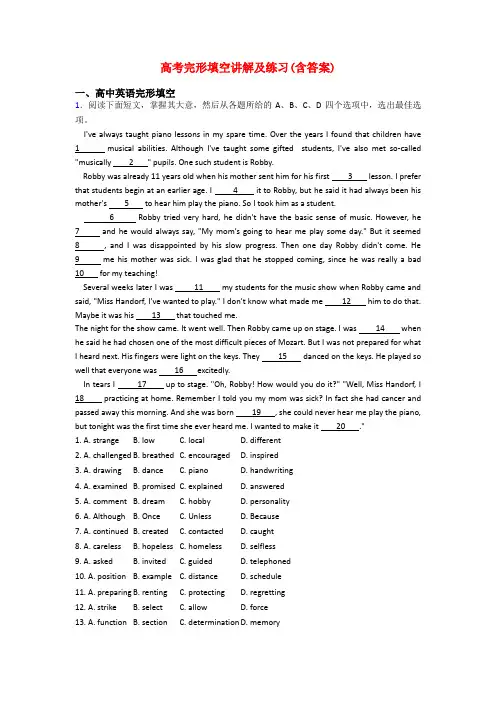
高考完形填空讲解及练习(含答案)一、高中英语完形填空1.阅读下面短文,掌握其大意,然后从各题所给的A、B、C、D四个选项中,选出最佳选项。
I've always taught piano lessons in my spare time. Over the years I found that children have 1 musical abilities. Although I've taught some gifted students, I've also met so-called "musically 2 " pupils. One such student is Robby.Robby was already 11 years old when his mother sent him for his first 3 lesson. I prefer that students begin at an earlier age. I 4 it to Robby, but he said it had always been his mother's 5 to hear him play the piano. So I took him as a student.6 Robby tried very hard, he didn't have the basic sense of music. However, he7 and he would always say, "My mom's going to hear me play some day." But it seemed8 , and I was disappointed by his slow progress. Then one day Robby didn't come. He9 me his mother was sick. I was glad that he stopped coming, since he was really a bad10 for my teaching!Several weeks later I was 11 my students for the music show when Robby came and said, "Miss Handorf, I've wanted to play." I don't know what made me 12 him to do that. Maybe it was his 13 that touched me.The night for the show came. It went well. Then Robby came up on stage. I was 14 whenhe said he had chosen one of the most difficult pieces of Mozart. But I was not prepared for whatI heard next. His fingers were light on the keys. They 15 danced on the keys. He played so well that everyone was 16 excitedly.In tears I 17 up to stage. "Oh, Robby! How would you do it?" "Well, Miss Handorf, I 18 practicing at home. Remember I told you my mom was sick? In fact she had cancer and passed away this morning. And she was born 19 , she could never hear me play the piano, but tonight was the first time she ever heard me. I wanted to make it 20 ."1. A. strange B. low C. local D. different2. A. challenged B. breathed C. encouraged D. inspired3. A. drawing B. dance C. piano D. handwriting4. A. examined B. promised C. explained D. answered5. A. comment B. dream C. hobby D. personality6. A. Although B. Once C. Unless D. Because7. A. continued B. created C. contacted D. caught8. A. careless B. hopeless C. homeless D. selfless9. A. asked B. invited C. guided D. telephoned10. A. position B. example C. distance D. schedule11. A. preparing B. renting C. protecting D. regretting12. A. strike B. select C. allow D. force13. A. function B. section C. determination D. memory14. A. limited B. satisfied C. calmed D. surprised15. A. indeed B. even C. actually D. either16. A. sitting B. cheering C. walking D. eating17. A. dragged B. drove C. ran D. picked18. A. kept back B. kept off C. kept on D. kept from19. A. shy B. weak C. blind D. deaf20. A. special B. humorous C. similar D. famous【答案】(1)D;(2)A;(3)C;(4)C;(5)B;(6)A;(7)A;(8)B;(9)B;(10)D;(11)A;(12)C;(13)C;(14)B;(15)D;(16)B;(17)C;(18)C;(19)D;(20)A;【解析】【分析】本文是一篇记叙文,作者在教学生钢琴的时候有一个学生Robby,因为没有音乐基础,总是学不好,他的梦想就是让他的妈妈听到他弹奏的声音,最后他弹奏出来很好听的音乐,而他的妈妈事实上是一个詟哑人还患有癌症,在他表演的当天去世了,去世的妈妈是第一次听到儿子弹奏的钢琴声。
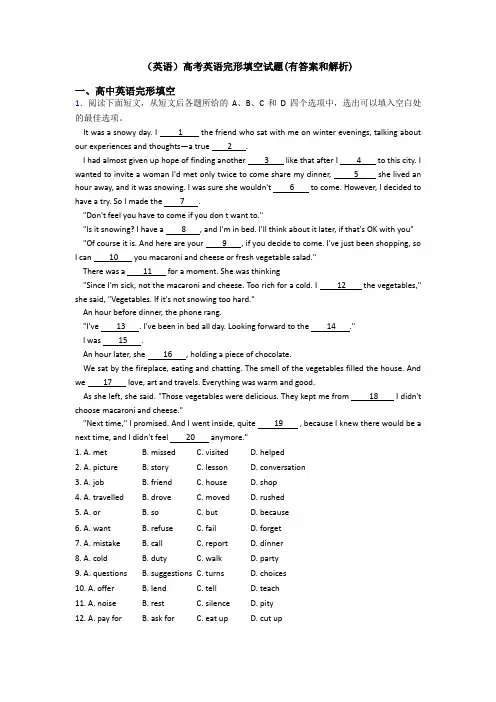
(英语)高考英语完形填空试题(有答案和解析)一、高中英语完形填空1.阅读下面短文,从短文后各题所给的A、B、C和D四个选项中,选出可以填入空白处的最佳选项。
It was a snowy day. I 1 the friend who sat with me on winter evenings, talking about our experiences and thoughts—a true 2 .I had almost given up hope of finding another 3 like that after I 4 to this city. I wanted to invite a woman I'd met only twice to come share my dinner, 5 she lived an hour away, and it was snowing. I was sure she wouldn't 6 to come. However, I decided to have a try. So I made the 7 ."Don't feel you have to come if you don t want to.""Is it snowing? I have a 8 , and I'm in bed. I'll think about it later, if that's OK with you" "Of course it is. And here are your 9 , if you decide to come. I've just been shopping, so I can 10 you macaroni and cheese or fresh vegetable salad."There was a 11 for a moment. She was thinking"Since I'm sick, not the macaroni and cheese. Too rich for a cold. I 12 the vegetables," she said, "Vegetables. If it's not snowing too hard."An hour before dinner, the phone rang."I've 13 . I've been in bed all day. Looking forward to the 14 ."I was 15 .An hour later, she 16 , holding a piece of chocolate.We sat by the fireplace, eating and chatting. The smell of the vegetables filled the house. And we 17 love, art and travels. Everything was warm and good.As she left, she said. "Those vegetables were delicious. They kept me from 18 I didn't choose macaroni and cheese.""Next time," I promised. And I went inside, quite 19 , because I knew there would be a next time, and I didn't feel 20 anymore."1. A. met B. missed C. visited D. helped2. A. picture B. story C. lesson D. conversation3. A. job B. friend C. house D. shop4. A. travelled B. drove C. moved D. rushed5. A. or B. so C. but D. because6. A. want B. refuse C. fail D. forget7. A. mistake B. call C. report D. dinner8. A. cold B. duty C. walk D. party9. A. questions B. suggestions C. turns D. choices10. A. offer B. lend C. tell D. teach11. A. noise B. rest C. silence D. pity12. A. pay for B. ask for C. eat up D. cut up13. A. given up B. given in C. got up D. got back14. A. vegetables B. chocolates C. letter D. holiday15. A. happy B. interested C. bored D. afraid16. A. waited B. finished C. stopped D. arrived17. A. heard about B. talked about C. wrote about D. cared about18. A. believing B. realizing C. regretting D. remembering19. A. satisfied B. worried C. lonely D. tired20. A. excited B. nervous C. proud D. sad【答案】(1)B;(2)D;(3)B;(4)C;(5)C;(6)A;(7)B;(8)A;(9)D;(10)A;(11)C;(12)B;(13)C;(14)A;(15)A;(16)D;(17)B;(18)C;(19)A;(20)D;【解析】【分析】本文是一篇记叙文,作者搬到一个新城市后,几乎没有信心找到一个可以坐下来一起聊天的朋友。
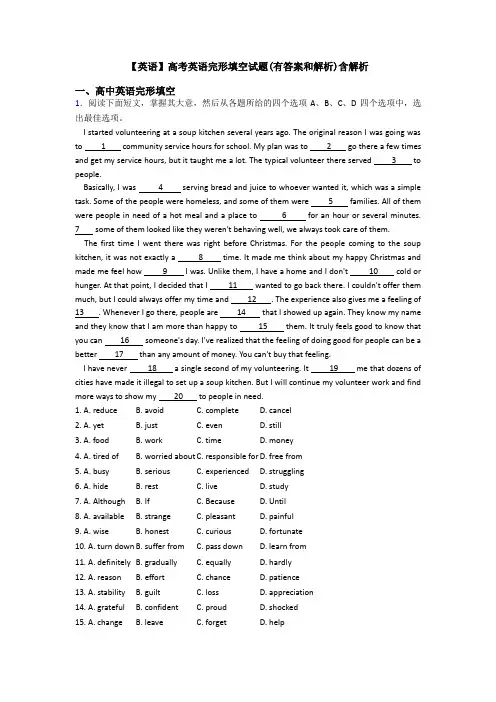
【英语】高考英语完形填空试题(有答案和解析)含解析一、高中英语完形填空1.阅读下面短文,掌握其大意,然后从各题所给的四个选项A、B、C、D四个选项中,选出最佳选项。
I started volunteering at a soup kitchen several years ago. The original reason I was going wasto 1 community service hours for school. My plan was to 2 go there a few times and get my service hours, but it taught me a lot. The typical volunteer there served 3 to people.Basically, I was 4 serving bread and juice to whoever wanted it, which was a simple task. Some of the people were homeless, and some of them were 5 families. All of them were people in need of a hot meal and a place to 6 for an hour or several minutes.7 some of them looked like they weren't behaving well, we always took care of them.The first time I went there was right before Christmas. For the people coming to the soup kitchen, it was not exactly a 8 time. It made me think about my happy Christmas and made me feel how 9 I was. Unlike them, I have a home and I don't 10 cold or hunger. At that point, I decided that I 11 wanted to go back there. I couldn't offer them much, but I could always offer my time and 12 . The experience also gives me a feeling of 13 . Whenever I go there, people are 14 that I showed up again. They know my name and they know that I am more than happy to 15 them. It truly feels good to know that you can 16 someone's day. I've realized that the feeling of doing good for people can be a better 17 than any amount of money. You can't buy that feeling.I have never 18 a single second of my volunteering. It 19 me that dozens of cities have made it illegal to set up a soup kitchen. But I will continue my volunteer work and find more ways to show my 20 to people in need.1. A. reduce B. avoid C. complete D. cancel2. A. yet B. just C. even D. still3. A. food B. work C. time D. money4. A. tired of B. worried about C. responsible for D. free from5. A. busy B. serious C. experienced D. struggling6. A. hide B. rest C. live D. study7. A. Although B. If C. Because D. Until8. A. available B. strange C. pleasant D. painful9. A. wise B. honest C. curious D. fortunate10. A. turn down B. suffer from C. pass down D. learn from11. A. definitely B. gradually C. equally D. hardly12. A. reason B. effort C. chance D. patience13. A. stability B. guilt C. loss D. appreciation14. A. grateful B. confident C. proud D. shocked15. A. change B. leave C. forget D. help16. A. describe B. waste C. brighten D. disturb17. A. reward B. excuse C. risk D. mistake18. A. planned B. regretted C. forgiven D. understood19. A. reminds B. confuses C. encourages D. disappoints20. A. talent B. concern C. kindness D. weakness【答案】(1)C;(2)B;(3)A;(4)C;(5)D;(6)B;(7)A;(8)C;(9)D;(10)B;(11)A;(12)C;(13)D;(14)A;(15)D;(16)C;(17)A;(18)B;(19)D;(20)C;【解析】【分析】本文是一篇记叙文,作者讲述了在流动厨房当志愿者的经历,最初打算去完成规定的服务时间,最后爱上了志愿者服务,喜欢去帮助别人。
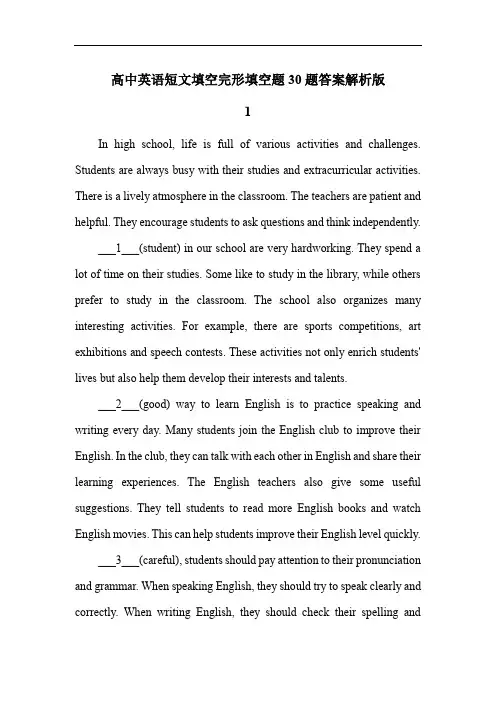
高中英语短文填空完形填空题30题答案解析版1In high school, life is full of various activities and challenges. Students are always busy with their studies and extracurricular activities. There is a lively atmosphere in the classroom. The teachers are patient and helpful. They encourage students to ask questions and think independently.___1___(student) in our school are very hardworking. They spend a lot of time on their studies. Some like to study in the library, while others prefer to study in the classroom. The school also organizes many interesting activities. For example, there are sports competitions, art exhibitions and speech contests. These activities not only enrich students' lives but also help them develop their interests and talents.___2___(good) way to learn English is to practice speaking and writing every day. Many students join the English club to improve their English. In the club, they can talk with each other in English and share their learning experiences. The English teachers also give some useful suggestions. They tell students to read more English books and watch English movies. This can help students improve their English level quickly.___3___(careful), students should pay attention to their pronunciation and grammar. When speaking English, they should try to speak clearly and correctly. When writing English, they should check their spelling andgrammar carefully. Some students are not very careful about these aspects, so they often make mistakes.___4___(quick) way to remember new words is to use them in sentences. When students learn new words, they should try to use them in their own sentences. This can help them remember the words better. Also, students can make flashcards to help them review new words. Flashcards are very convenient and useful.___5___(happy), high school life is full of challenges and opportunities. Students should cherish this precious time and work hard to achieve their dreams.1. A. Students B. Teachers C. Parents D. Friends答案:A。
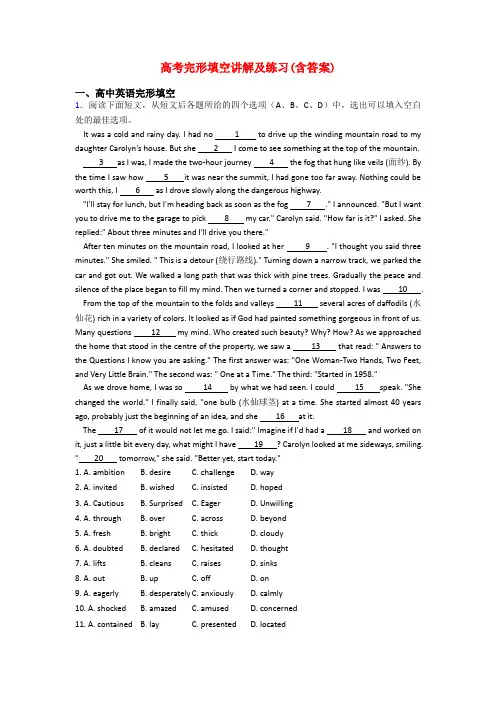
高考完形填空讲解及练习(含答案)一、高中英语完形填空1.阅读下面短文,从短文后各题所给的四个选项(A、B、C、D)中,选出可以填入空白处的最佳选项。
It was a cold and rainy day. I had no 1 to drive up the winding mountain road to my daughter Carolyn's house. But she 2 I come to see something at the top of the mountain.3 as I was, I made the two-hour journey4 the fog that hung like veils (面纱). By the time I saw how5 it was near the summit, I had gone too far away. Nothing could be worth this, I6 as I drove slowly along the dangerous highway."I'll stay for lunch, but I'm heading back as soon as the fog 7 ." I announced. "But I want you to drive me to the garage to pick 8 my car." Carolyn said. "How far is it?" I asked. She replied:" About three minutes and I'll drive you there."After ten minutes on the mountain road, I looked at her 9 . "I thought you said three minutes." She smiled. " This is a detour (绕行路线)." Turning down a narrow track, we parked the car and got out. We walked a long path that was thick with pine trees. Gradually the peace and silence of the place began to fill my mind. Then we turned a corner and stopped. I was 10 . From the top of the mountain to the folds and valleys 11 several acres of daffodils (水仙花) rich in a variety of colors. It looked as if God had painted something gorgeous in front of us. Many questions 12 my mind. Who created such beauty? Why? How? As we approached the home that stood in the centre of the property, we saw a 13 that read: " Answers to the Questions I know you are asking." The first answer was: "One Woman-Two Hands, Two Feet, and Very Little Brain." The second was: " One at a Time." The third: "Started in 1958."As we drove home, I was so 14 by what we had seen. I could 15 speak. "She changed the world." I finally said, "one bulb (水仙球茎) at a time. She started almost 40 years ago, probably just the beginning of an idea, and she 16 at it.The 17 of it would not let me go. I said:" Imagine if I'd had a 18 and worked on it, just a little bit every day, what might I have 19 ? Carolyn looked at me sideways, smiling. " 20 tomorrow," she said. "Better yet, start today."1. A. ambition B. desire C. challenge D. way2. A. invited B. wished C. insisted D. hoped3. A. Cautious B. Surprised C. Eager D. Unwilling4. A. through B. over C. across D. beyond5. A. fresh B. bright C. thick D. cloudy6. A. doubted B. declared C. hesitated D. thought7. A. lifts B. cleans C. raises D. sinks8. A. out B. up C. off D. on9. A. eagerly B. desperately C. anxiously D. calmly10. A. shocked B. amazed C. amused D. concerned11. A. contained B. lay C. presented D. located12. A. filled B. disturbed C. occurred D. confused13. A. signal B. symbol C. note D. sign14. A. encouraged B. inspired C. moved D. thrilled15. A. hardly B. rarely C. simply D. totally16. A. brought B. continued C. made D. kept17. A. wonder B. doubt C. mystery D. idea18. A. view B. vision C. sight D. scene19. A. predicted B. expected C. accomplished D. explored20. A. Behave B. Take C. Set D. Start【答案】(1)B;(2)C;(3)D;(4)A;(5)C;(6)D;(7)A;(8)B;(9)C;(10)B;(11)B;(12)A;(13)D;(14)C;(15)A;(16)D;(17)A;(18)B;(19)C;(20)D;【解析】【分析】本文是一篇记叙文,作者应女儿之邀,开车去找女儿,在女儿的带领下发现了满地的水仙花,并由此产生了感悟。
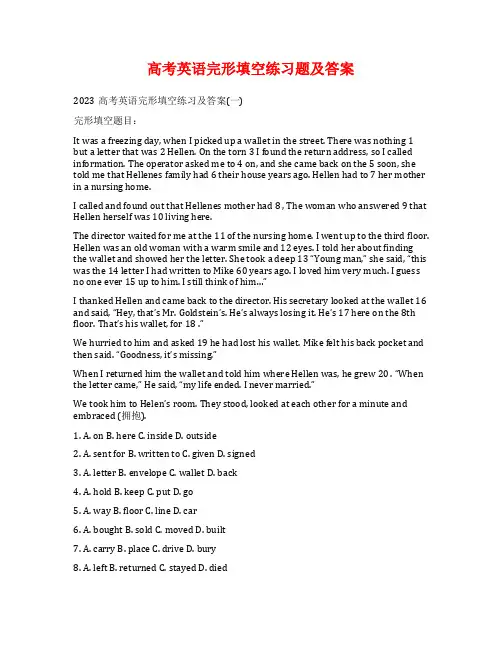
高考英语完形填空练习题及答案2023高考英语完形填空练习及答案(一)完形填空题目:It was a freezing day, when I picked up a wallet in the street. There was nothing 1 but a letter that was 2 Hellen. On the torn 3 I found the return address, so I called information. The operator asked me to 4 on, and she came back on the 5 soon, she told me that Hellenes family had 6 their house years ago. Hellen had to 7 her mother in a nursing home.I called and found out that Hellenes mother had 8 , The woman who answered 9 that Hellen herself was 10 living here.The director waited for me at the 11 of the nursing home. I went up to the third floor. Hellen was an old woman with a warm smile and 12 eyes. I told her about finding the wallet and showed her the letter. She took a deep 13 “Young man,” she said, “t his was the 14 letter I had written to Mike 60 years ago. I loved him very much. I guess no one ever 15 up to him. I still think of him…”I thanked Hellen and came back to the director. His secretary looked at the wallet 16 and said, “Hey, that’s Mr. Goldstein’s. He’s always losing it. He’s 17 here on the 8th floor. That’s his wallet, for 18 .”We hurried to him and asked 19 he had lost his wallet. Mike felt his back pocket and then said. “Goodness, it’s missing.”When I returned him the wallet and told him where Hellen was, he grew 20 . “When the letter came,” He said, “my life ended. I never married.”We took him to Helen’s room. They stood, looked at each other for a minute and embraced (拥抱).1. A. on B. here C. inside D. outside2. A. sent for B. written to C. given D. signed3. A. letter B. envelope C. wallet D. back4. A. hold B. keep C. put D. go5. A. way B. floor C. line D. car6. A. bought B. sold C. moved D. built7. A. carry B. place C. drive D. bury8. A. left B. returned C. stayed D. died9. A. explained B. thought C. discovered D. considered10. A. again B. still C. now D. then11. A. door B. house C. office D. wall12. A. bursting B. freezing C. friendly D. lively13. A. dive B. sight C. how D. breath14. A. important B. oldest C. first D. last15. A. went B. matched C. caught D. measured16. A. immediately B. clearly C. closely D. exactly17. A. also B. over C. right D. still18. A. sure B. pleasure C. help D. interest19. A. that B. if C. where D. when20. A. nervous B. silent C. pale D. anxious参考答案:1~5 CDBAC 6~10 BBDAB 11~15 ACDDB 16~20 CAABC2023高考英语完形填空练习及答案(二)完形填空题目:Less than a week after we moved in, there was a terrible 8 . We came home from the store that night to find the spruce 9 almost totally from the ground and thrown onto the street. When my brother Frankie and I saw the spruce, our hearts 10 . But not Dad’s.I looked at the 19 and wanted to cry, I couldn’t 20 to got back into the campaign.1. A. classes B. lecture C. lessons D. talks2. A. struggle B. working C. battle D. defence3. A. turned B. took C. came D. picked4. A. kept B. worked C. dealt D. helped5. A. heart B. mind C. head D. book6. A. came B. left C. got D. moved7. A. yard B. field C. flowers D. trees8. A. storm B. rain C. snow D. wind9. A. pushed B. pulled C. put D. struck10. A. fell B. rose C. sank D. dropped12. A. stand B. plant C. die D. grow13. A. no B. yes C. it D. nothing14. A. made B. gave C. tied D. kept15. A. put B. left C. placed D. lay16. A. pulling B. pushing C. holding D. fixing17. A. take B. put C. pull D. push18. A. leaves B. roots C. trunk D. branches19. A. picture B. card C. tree D. rain20. A. wait B. stop C. leave D. stay参考答案:1~5 CAACB 6~10 DDABC 11~15 BDACD 16~20 ADCBA。
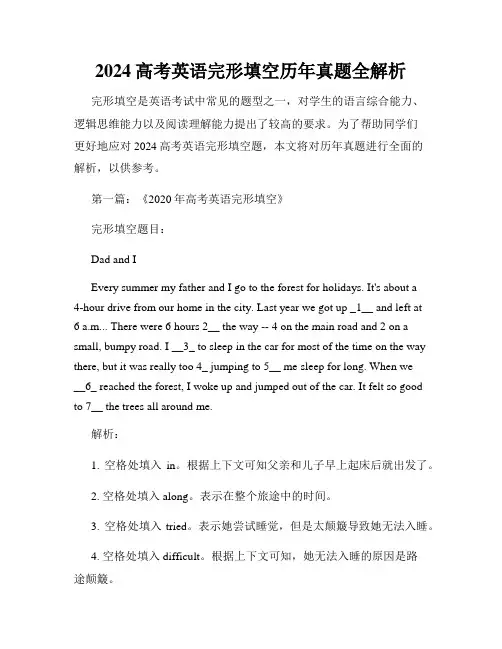
2024高考英语完形填空历年真题全解析完形填空是英语考试中常见的题型之一,对学生的语言综合能力、逻辑思维能力以及阅读理解能力提出了较高的要求。
为了帮助同学们更好地应对2024高考英语完形填空题,本文将对历年真题进行全面的解析,以供参考。
第一篇:《2020年高考英语完形填空》完形填空题目:Dad and IEvery summer my father and I go to the forest for holidays. It's about a4-hour drive from our home in the city. Last year we got up _1__ and left at6 a.m... There were 6 hours 2__ the way -- 4 on the main road and 2 on a small, bumpy road. I __3_ to sleep in the car for most of the time on the way there, but it was really too 4_ jumping to 5__ me sleep for long. When we__6_ reached the forest, I woke up and jumped out of the car. It felt so goodto 7__ the trees all around me.解析:1. 空格处填入in。
根据上下文可知父亲和儿子早上起床后就出发了。
2. 空格处填入along。
表示在整个旅途中的时间。
3. 空格处填入tried。
表示她尝试睡觉,但是太颠簸导致她无法入睡。
4. 空格处填入difficult。
根据上下文可知,她无法入睡的原因是路途颠簸。
5. 空格处填入let。
这里表示路途的颠簸让她无法睡得很长时间。
6. 空格处填入finally。
When Beverley Burdeyney turned seventy four last year, she started having problems with her___1___ , notably dryness and discomfort."I was simply ___2___ a terrible experience, " Ms. Burdeyney said at her home in Toronto. "I felt so helpless and insecure because the quality of my ___3___ was affected. "Ms. Burdeyney talked to some friends who had ___4___ problems and discovered that they were largely suffering in ___5___. " Nobody chooses to talk about it because it seems so ___6___ she said. " But more and more are suffering and lives are being ___7___.Eventually, Ms. Burdeyney learned about plans for an eye research, ___8___ at Tel Aviv University in Israel. The research team ___9___ Canadian doctor Allan Slomovic, who hasdone____10____ work on eye care using stem cells. Seeing a ray of hope, Ms. Burdeyney began raising ____11____ for the project with a friend, Toronto businessman Meyer Zeifman.____12____ she has raised $ 110, 000 with another $40, 000 ____13____ ."I'm trying to get more and more people to ____14____ that there are solutions(解决办法)said Ms. Burdeyney, a trained nurse who is still working as a personal trainer after ____15____ . "I say there is no old ____16____ , there's only neglect (忽视). Don't stand ____17____ , do something about it. "Ms. Burdeyney ____18____ that she is hoping to do more for the research project. "I just want to bring ____19____ into people eyes and this is just the ____20____. There is still a long way to go"1.A.throat B.skin C.lungs D.eyes 2.A.getting over B.going through C.holding on D.passing down 3.A.story B.treatment C.life D.relationship 4.A.similar B.various C.personal D.special 5.A.turn B.peace C.vain D.silence 6.A.unbearable B.abnormal C.insignificant D.disturbing 7.A.compromised B.forgotten C.substituted D.separated 8.A.course B.program C.paper D.conference 9.A.informed B.doubted C.included D.dismissed 10.A.part-time B.controversial C.voluntary D.ground-breaking 11.A.money B.standards C.awareness D.questions12.A.As ever B.So far C.In return D.Once again 13.A.wasted B.donated C.expected D.earned 14.A.imagine B.confirm C.remember D.understand 15.A.retirement B.childbirth C.graduation D.marriage 16.A.time B.rule C.age D.tale 17.A.straight B.still C.firm D.alone 18.A.commented B.learned C.reminded D.added 19.A.light B.joy C.color D.beauty 20.A.future B.beginning C.truth D.meaning Over the past 38 years, Mr. Wang has pretended to be someone else many times,and has even learned to ____21____ different dialects(方言),leading to him being described as an “Oscar-winning actor".The 60-year-old is not an actor, but a ____22____ However,he is more devoted to his“____23____ "than any real actor.In the 1990s, a group of thieves often sold stolen goods with the help of some beggars. To look into the ____24____,Wang disguised(伪装)himself and ____25____ the beggars. Dirty shorts and old shoes gave him the ____26____ of a real beggar and his convincing dialect soon won him the ____27____ of the beggars.“I often ____28____ them to drink alcohol. Once they were ____29____,they began to talk a lot,"Wang said. “I'd then ____30____ myself to use the toilet, ____31____ what the beggars said, and send the ____32____ to my teammates.”Wang,who is often in ____33____ situations,is also a judo (柔道)master.“As long as I get close enough, no criminal can ____34____ from me," he said.Wang's ____35____ won him several honors, including a National May Day Labor Medal and 11 Citations of Merit.Paris.21.A.teach B.compare C.assess D.speak 22.A.lawyer B.doctor C.policeman D.businessman 23.A.role B.study C.family D.audience 24.A.minor B.case C.future D.question25.A.interviewed B.joined C.arrested D.assisted 26.A.challenge B.experience C.appearance D.freedom 27.A.vote B.sympathy C.permission D.trust 28.A.invited B.forced C.helped D.expected 29.A.drunk B.deserted C.bored D.lost 30.A.guide B.persuade C.excuse D.allow 31.A.refer to B.note down C.ask about D.miss out 32.A.plan B.agreement C.direction D.information 33.A.awkward B.dangerous C.unfortunate D.strange 34.A.separate B.recover C.escape D.hear 35.A.courage B.honesty C.kindness D.optimism It was a busy morning, about 8:30, when an elderly gentleman in his 80s came to the hospital.I heard him saying to the nurse that he was in a hurry for appointment (约会)at 9:30.The nurse had him take a ____36____ in the waiting area, ____37____ him it would be at least 40 minutes ____38____ someone would be able to see him. I saw him ____39____ his watch and decided, since I was ____40____ busy—my patient didn’t ____41____ at the appointed hour, I would examine his wound. While taking care of his wound, I asked him if he had another doctor’s appointment.The gentleman said no and told me that he ____42____ to go to the nursing home on eat breakfast with his ____43____. He told me that she had been ____44____ for a while and that she had a special disease, I asked if she would be ____45____ if he was a bit late. He replied that she ____46____ knew who he was, that she had not been able to ____47____ him for five years now.I was ____48____ and asked him,“And you ____49____ go every morning, even though she doesn’t know who you are?”He smiled and said.“She doesn’t know me, but I know who she is.”I had to hold back____50____ as he left.Now I ____51____ that in marriages, true love is ____52____ of all that. The happiest people don’t ____53____ have the best of everything;they just ____54____ the best of everything they have. ____55____ isn’t about how to live through the storm, but how to dance in the rain. 36.A.breath B.test C.seat D.break37.A.persuading B.promising C.understanding D.telling38.A.if B.before C.since D.after 39.A.taking off B.fixing C.looking at D.winding 40.A.very B.also C.seldom D.not41.A.turn up B.show off C.come on D.go away 42.A.needed B.forgot C.agreed D.happened 43.A.daughter B.wife C.mother D.sister44.A.late B.well C.around D.there 45.A.lonely B.worried C.doubtful D.hungry46.A.so far B.neither C.no longer D.already 47.A.recognize B.answer C.believe D.expect 48.A.moved B.disappointed C.surprised D.satisfied 49.A.only B.then C.thus D.still 50.A.curiosity B.tears C.words D.judgment 51.A.realize B.suggest C.hope D.prove 52.A.agreement B.expression C.acceptance D.exhibition 53.A.necessarily B.completely C.naturally D.frequently 54.A.learn B.make C.favor D.try 55.A.Adventure B.Beauty C.Trust D.Life Recently,I took a trip home by train.I got a seat opposite a middle-aged man with sharp eyes,who kept____56____a young woman in a window seat with a little boy on her lap.The woman's eye fell on the man's face,and she immediately looked down and____57____her scarf.As the night wore on,people began to close their eyes,but the seats were so uncomfortable that only a very heavy sleeper could manage to get any____58____.The woman looked over at the man.He was still staring at her.She looked back at him with fire in her eyes.I was beginning to get____59____,too.The train moved on.The little boy was ____60____ awake on his mother's lap,but the woman dropped off to sleep.A moment later,he began to____61____the half-open window—one leg went over it.The man jumped up and ____62____the child just before he fell out.The____63____ woke up the woman.She seemed to be in____64____,and then reality dawned(显现).“Your child has been looking for an opportunity to climb out of the window,”the man said as he gave the child back to her. .“So I have been watching the whole time.”The woman was _____65_____,and so was I.56.A.guiding B.bothering C.watching D.monitoring 57.A.adjusted B.changed C.packed D.waved 58.A.air B.joy C.space D.rest 59.A.nervous B.embarrassed C.angry D.disappointed 60.A.almost B.still C.hardly D.even 61.A.drag B.climb C.knock D.push 62.A.grabbed B.rocked C.touched D.picked 63.A.alarm B.quarrel C.risk D.noise 64.A.sorrow B.relief C.panic D.pain 65.A.astonished B.confused C.concerned D.inspired My mother is 92. Unless I have to be out of town, each week I take my mother to do her___66___ and visit the doctor, providing ___67___ and transportation. During the week, however, she likes to go to a nearby store to ___68___ some small things she needs.Last week she walked up to the store, but when she went to pay for her groceries, she was___69___ about three dollars. The only ___70___ to pay for the groceries was to take off the___71___ she could do without: a bottle of rubbing alcohol(医用酒精)and a bar of soap. By taking of these, she was able to ___72___ the new total to the amount of cash she had with her.At this store, people ___73___ and then go off to the side to ___74___ their own groceries. My mother was putting her groceries into shopping bags when a ____75____ came up to her and said, "Here are the things that you ____76____ ." handing her the rubbing alcohol and the____77____ . My mother, who is never speechless, was speechless. She ____78____ for the woman's name and address so that she could ____79____ her. The woman told her it was her____80____ .My mother was so ____81____ by her gesture that she decided to go back to the store and give the cashier(收银员)a five-dollar bill to keep on hand ____82____ the same happened to someone else if they didn't have enough ____83____ for all of their groceries.So, whoever you are, thank you for the random act of ____84____ that not only helped my motherout, but ____85____ too.66.A.exercise B.housework C.cooking D.shopping 67.A.reward B.medicine C.company D.shelter 68.A.return B.collet C.order D.buy 69.A.short B.cautious C.wrong D.concerned 70.A.aim B.way C.advice D.reason 71.A.weight B.things C.mask D.glasses 72.A.raise B.add C.bring D.switch 73.A.show up B.call in C.check out D.sit down 74.A.store B.select C.deliver D.bag 75.A.stranger B.cashier C.friend D.doctor 76.A.looked for B.talked about C.threw away D.put back 77.A.receipt B.soap C.cash D.bottle 78.A.asked B.waited C.cared D.searched 79.A.repay B.trust C.recognize D.help 80.A.luck B.chance C.gift D.turn 81.A.surprised B.amused C.touched D.convinced 82.A.in case B.even if C.as though D.so that 83.A.energy B.money C.space D.time 84.A.faith B.courage C.kindness D.honor 85.A.made her day B.changed her mind C.caught her eye D.met her demand It's the seaside birds that deserve at least part of the blame for getting Nick Burchill blacklisted at the Fairmont Empress Hotel in Victoria, Canada.Burchill was ___86___ at the hotel on business and planning to ___87___ some friends in the area. They had asked him to ___88___ some pepperoni (辣香肠) from back east. So he ___89___ a suitcase full of pepperoni. As he was ___90___ that it would be too warm, he ___91___ it out on the table near an open window. He thought his pepperoni was ___92___ and well chilled (冷却) and he ___93___ .That's when things went ____94____ “I remember walking down the long _____95_____ and opening the door to my room to find an entire flock of seagulls,” Burchill said in a recentletter of _____96_____ to the 4-star hotel. "The seagulls immediately went _____97_____ . They rushed to the window, 30 or 40 birds all trying to _____98_____ at the same time, and pepperoni—everywhere. The curtains were falling down, the lamps were falling down, It was a real _____99_____ .Older and wiser now, Burchill chalked up the incident to youthful indiscretion (莽撞).“I have _____100_____ and I admit responsibility of my _____101_____,” he said in the letter. “I come to you, _____102_____ , to apologize for the-damage I had _____103_____ caused and to ask you to _____104_____ my lifetime ban from the hotel.”His letter _____105_____ . Banned from the hotel since 2001.Burchill is now welcome to come back, the Fairmont said.86.A.studying B.staying C.looking D.packing 87.A.visit B.help C.follow D.make 88.A.sell B.have C.bring D.taste 89.A.filled B.locked C.abandoned D.lost 90.A.surprised B.pleased C.excited D.worried 91.A.dug B.cleared C.cut D.laid 92.A.delicious B.safe C.soft D.ready 93.A.left B.nodded C.waited D.regretted 94.A.far B.funny C.wrong D.blind 95.A.beach B.driveway C.hall D.table 96.A.application B.apology C.request D.invitation 97.A.hungry B.dead C.missing D.wild 98.A.wake up B.get out C.take off D.break in 99.A.mess B.puzzle C.fight D.challenge 100.A.recovered B.retired C.escaped D.matured 101.A.suffering B.plans C.madness D.actions 102.A.hands in pocket B.nose in the air C.hat in hand D.feet on the ground103.A.indirectly B.deliberately C.cautiously D.secretly 104.A.replace B.remember C.reconsider D.renew105.A.arrived B.worked C.ended D.disappeared Simply saying thank you doesn't seem enough in certain situations. I was considering this while working as a ___106___ just a few weeks ago. And it came to me then how much easier it would be if we had a range of words that express different ___107___ of gratitude(感谢).My thoughts were soon ___108___. We had a woman patient who was ___109___ from a knee replacement operation. One afternoon, while ___110___ to get into bed she collapsed(倒下) from what was ___111___ discovered to be a heart attack. The collapse was disastrous,___112___the emergency medical team and good teamwork. But she recovered, though___113___, and was ready for discharge(出院)after four weeks.She was ___114___ for everything that the medical and nursing team had done for her. On her day of discharge, we shared in her _____115_____ at her recovery. As she was_____116_____ she was eager to say _____117_____ to each of us in the nursing team. When she _____118_____ one nurse, she tried to press a five-pound note into her hand. My colleague_____119_____ to accept it, saying that we were all just _____120_____ our job. The patient looked puzzled, and then _____121_____:“Oh this isn't for the_____122_____ I had. I take that as a _____123_____. No, this is for setting my hair yesterday.”And there you have it. To many people,_____124_____lives is part of the job but styling hair is an _____125_____ and should be rewarded.106.A.cleaner B.chemist C.nurse D.doctor 107.A.grades B.meanings C.needs D.expectations 108.A.brushed aside B.put to the test C.brought under discussion D.taken into account109.A.departing B.escaping C.retiring D.recovering 110.A.attempting B.choosing C.pausing D.promising 111.A.eventually B.fortunately C.casually D.secretly 112.A.assessing B.requiring C.forming D.proving 113.A.slightly B.accidentally C.slowly D.happily 114.A.grateful B.thoughtful C.sorrowful D.fearful 115.A.surprise B.delight C.curiosity D.disappointment116.A.operating B.thinking C.hesitating D.leaving 117.A.sorry B.hello C.goodbye D.yes 118.A.reached B.consulted C.introduced D.persuaded 119.A.wished B.pretended C.failed D.refused 120.A.enjoying B.doing C.securing D.starting 121.A.repeated B.recited C.replied D.reported 122.A.courage B.patience C.duty D.care 123.A.goal B.given C.push D.greeting 124.A.risking B.changing C.saving D.building 125.A.honour B.ability C.opening D.extra My life as a tax-paying employed person began in middle school, when, for three whole days, I worked in a baking factory.My best friend Betsy’s father was a manager at Hough Bakeries, which, at Easter time,____126____ little bunny (兔子) cakes for all its ____127____throughout Cleveland. It happened that the plant downtown needed eight kids for ____128____ help during our spring break, for which I had no____129____ beyond listening to my favorite records. I’d ____130____ minimum wage. I’d see how a factory____131____. My parents thought all of this was a grand idea and called Betsy’s dad with their ____132____.Our____133____in the factory were simple: Place cakes on a moving belt. Attach icing (糖霜) ears. Apply icing eyes and nose.____134____ bunny from the belt. This was _____135_____ than it sounds._____136_____ a bit and the cakes pile up. As I told my parents at dinner that first night, it was all a little more high-pressure than I’d_____137_____ .Dad ____138____. The son of a grocer, he’d spent the summers of his childhood_____139_____ food in Benardsville, New Jersey. This was the sort of work that made you_____140_____ the dollars you earned and respect those who did the work, he told me.126.A.sold B.ordered C.made D.reserved 127.A.stores B.families C.schools D.citizens 128.A.generous B.financial C.technical D.temporary 129.A.plans B.problems C.excuses D.hobbies130.A.offer B.earn C.set D.suggest 131.A.worked B.closed C.developed D.survived 132.A.ambition B.permission C.experience D.invitation 133.A.joys B.ideas C.roles D.choices 134.A.Save B.Keep C.Stop D.Remove 135.A.harder B.better C.longer D.cheaper 136.A.Calm down B.Slow down C.Stay on D.Move on 137.A.indicated B.witnessed C.expected D.remembered 138.A.cried B.smiled C.hesitated D.refused 139.A.tasting B.finding C.sharing D.delivering 140.A.withdraw B.donate C.receive D.appreciate It has been argued by some that gifted children should be grouped in special classes. The____141____ is based on the belief that in regular classes these children are held back in their intellectual (智力的)growth by____142____ situations that are designed forthe____143____ children.There can be little doubt that ____144____ classes can help the gifted children to graduate earlier and take their place in life sooner. However, to takethese____145____ out of the regular classes may create serious problems.I observed a number of ____146____ children who were taken out of a special class and placed in a____147____ class. In the special class, they showed little ability to use their own judgment, relying____148____ on their teachers’ directions. In the regular class, having no worry about keeping up, they began to reflect____149____ on many problems, some of which were not on the school program.Many are concerned that gifted children become____150____ and lose interest in learning. However, this____151____ is more often from parents and teachers than from students, and some of these____152____ simply conclude that special classes should be set up for those who are____153____. Some top students do feel bored in class, but why they____154____ sogoes far beyond the work they have in school. Studies have shown that to be bored is to be anxious. The gifted child who is bored is an____155____ child.141.A.principle B.theory C.argument D.classification 142.A.designing B.grouping C.learning D.living 143.A.smart B.curious C.mature D.average 144.A.regular B.special C.small D.creative 145.A.children B.programs C.graduates D.designs 146.A.intelligent B.competent C.ordinary D.independent 147.A.separate B.regular C.new D.boring 148.A.specially B.slightly C.wrongly D.heavily 149.A.directly B.cleverly C.voluntarily D.quickly 150.A.doubted B.bored C.worried D.tired 151.A.concern B.conclusion C.reflection D.interest 152.A.students B.adults C.scholars D.teachers 153.A.talented B.worried C.learned D.interested 154.A.believe B.think C.say D.feel 155.A.outstanding B.intelligent C.anxious D.ordinary For most people, having things stolen feels like an offence. Robbie Pruitt admitted that he got ____156____ when he discovered the theft of his mountain bike last September. But soon enough, his ____157____ took a turn. After letting go of his anger and frustration, he found himself on a road to sympathy ____158____.For Pruitt, a keen bicyclist, the first thing to do was ____159____ his stolen bike. But when he went bike shopping, he found few available, which got him thinking: What if the ____160____ of bikes was Covid-19 related, and what if the person who'd taken his bike really needed____161____ to get to work?With that thought in mind, Pruitt ____162____ a plan and posted it on the community website. He ____163____ to fix bikes free of charge for anyone who needed it. He also asked for unwanted bikes, which he would repair-again ____164____. And then he would donate them to folks who could truly use them but didn't have the ____165____ to buy one.The day the post went live, Pruitt received thirty ____166____ bicycles. Then came more than 500 ____167____ for detailed information. By the end of 2020, Pruitt had repaired more than 140 for donation or to be ____168____ to their owners.Pruitt tries to give his donations to families that are ____169____ struggling. ____170____ simply satisfying a material need, he has provided an opportunity for kids in his neighborhood to learn how to fix their own bikes.In addition to ____171____ skills, Pruitt's lessons teach teamwork, encourage self-worth, and promote feelings of community. ____172____, the kids have gained a sense of accomplishment. "It's a really great ____173____ for kids,“ said a neighbor in an interview with the local newspaper. "Pruitt is certainly providing a ____174____, but it's not just the bikes. It's the relationships in the community. It's the ____175____ that he can make on people." 156.A.amazed B.mad C.curious D.frightened 157.A.emotions B.career C.opinions D.route 158.A.ever B.together C.instead D.yet 159.A.ride B.lock C.repair D.replace 160.A.lack B.variety C.increase D.quality 161.A.instruction B.qualification C.transportation D.permission 162.A.came up with B.stuck to C.gave up D.broke away from 163.A.remembered B.refused C.hesitated D.offered 164.A.by accident B.in advance C.for free D.on credit 165.A.profit B.budget C.courage D.excuse 166.A.shared B.used C.expensive D.modern 167.A.enquiries B.advertisements C.notices D.announcements 168.A.exported B.sold C.lent D.returned 169.A.hardly B.slightly C.truly D.instantly 170.A.Without B.Beyond C.Upon D.Among 171.A.practical B.commercial C.mathematical D.social 172.A.Otherwise B.However C.Somehow D.Meanwhile 173.A.promise B.celebration C.comfort D.experience 174.A.competition B.service C.ceremony D.suggestion175.A.compromise B.impression C.impact D.progress参考答案:1.D2.B3.C4.A5.D6.C7.A8.B9.C10.D11.A12.B13.C14.D15.A16.C17.B18.D19.A20.B【解析】【分析】这是一篇记叙文。
【英语】高考英语完形填空题20套(带答案)含解析一、高中英语完形填空1.阅读下面短文,掌握其大意,然后从各题所给的A,B,C,D四个选项中,选出可以填入空白处的最佳选项。
"Meow, meow, meow," is what I heard as I walked through the alley(小巷;胡同). I approached the noise and noticed a tail sticking out from under a piece of wood. Under the wood was a 1 black and white cat. I picked him up and 2 he must be freezing to death.I 3 home with the cat held in my jacket.My new best friend, who soon became known as Little Bit, received his name because he was almost 4 when I held him in my hands. He stood about five inches tall. Little Bit's small size had a great advantage - he 5 perfectly in the pocket of my jacket, which made 6 him everywhere very easy. Any time I was home, he wouldn't leave my 7 . He was always eager to play with me. When I fell asleep at night, he would always 8 up aroundmy head to ensure that I was warm.Unfortunately, I grew up. My teenage life 9 my relationship with Little Bit. I lived at such a fast pace that I stopped 10 time for him. My free time was spent with my friends instead. I would come in the house on my phone and not 11 him at all. His meows became an annoyance to me, but it wasn't his 12 that he wanted his best friend back.Time had caused a 13 to Little Bit. His body began 14 down and by the time I realized something was wrong with him, he had already lost his balance. He lay there and lookedat me, and 15 this day I still remember the 16 look in his bright green eyes. I took him to the vet (兽医), but there was nothing he could do. The last time I 17 him he wasn't the same tiny cat I had found ten years before. Little Bit filled my arms and he was put to sleep that day.Little Bit's 18 made me realize how much he meant to me. He was always there for me when I needed him. I 19 our last years together and I feel sorry for not always being there for him. I will always 20 the special memories we made.1. A. lovely B. tiny C. pretty D. friendly2. A. agreed B. insisted C. realized D. proved3. A. left B. stayed C. drove D. hurried4. A. weightless B. useless C. breathless D. hopeless5. A. grew B. fitted C. played D. existed6. A. showing B. keeping C. taking D. guiding7. A. mind B. heart C. body D. side8. A. rise B. stand C. wake D. roll9. A. weakened B. fastened C. deepened D. sharpened10. A. making B. losing C. wasting D. gaining11. A. overlook B. interrupt C. acknowledge D. recognize12. A. desire B. purpose C. fault D. greed13. A. fear B. loss C. delay D. concern14. A. dropping B. tearing C. calming D. shutting15. A. on B. to C. in D. for16. A. shameful B. hateful C. harmful D. sorrowful17. A. helped B. protected C. held D. cured18. A. illness B. death C. sadness D. pressure19. A. regret B. bother C. confuse D. dream20. A. treasure B. admire C. evaluate D. explore【答案】(1)B;(2)C;(3)D;(4)A;(5)B;(6)C;(7)D;(8)D;(9)A;(10)A;(11)C;(12)C;(13)B;(14)D;(15)B;(16)D;(17)C;(18)B;(19)A;(20)A;【解析】【分析】本文是一篇记叙文,作者捡了一只小猫,给它起名叫Little Bit,并与之建立了很深厚的感情。
高三英语完形填空题20套(带答案)含解析一、高中英语完形填空1.阅读下面短文,从短文后所给各题的四个选项(A、B、C和D)中,选出可以填入空白处的最佳选项。
My first-grade teacher, Mr. Gunderson, once told my class a story. A father is killed in a car accident and the son is 1 hurt. But when the boy arrives at the 2 , the doctor on duty says, "I can't 3 surgery on this patient. This is my son!" Mr. Gunderson asked, "Whois the doctor?" Hands went up and my classmates shouted out 4 , but they didn't arrive at the correct answer. Mr. Gunderson didn't let me 5 because he knew it would be very easy for me to understand that the surgeon was the boy's 6 . I suppose that Mr. Gunderson's 7 would be a lot easier for today's first-graders.Being a doctor at that time, my mother was considered very 8 because female doctors were rare then. 9 , to my sister and me, she was and is just Mom. When we were kids, we came home from school to a 10 , who watched us until our parents came home. Mom took Friday off so she could spend more time with us, and we could tell that she felt 11 about not being home more often.My younger sister and I 12 at a fairly young age that this was Mom's weak spot, andwe 13 it mercilessly whenever we wanted a new toy or snacks. I wish I had 14 doing that the first time Mom told me about one of her 15 who had died, but I'm sure I didn't. I can't imagine what it's like to spend all day taking care of other people's 16 children, some of whom are not going to 17 it, and then come home to find that your own kids are acting like that. We were just like 18 brats (顽童) then. I suppose she could have found our guilty weak spots to make us 19 , but she never did. I think I'd better 20 her for that.1. A. simply B. seriously C. frequently D. gradually2. A. cafeteria B. station C. hospital D. room3. A. deliver B. represent C. clarify D. perform4. A. guesses B. instructions C. explanations D. suggestions5. A. answer B. conclude C. question D. demand6. A. stepfather B. grandpa C. mother D. uncle7. A. trick B. puzzle C. theory D. principle8. A. special B. wealthy C. average D. urgent9. A. Therefore B. However C. Otherwise D. Thus10. A. member B. passenger C. passer-by D. baby-sitter11. A. angry B. curious C. cautious D. sorry12. A. made B. designed C. figured D. worked13. A. kept away from B. took possession of C. settled down to D. took advantage of14. A. stopped B. continued C. considered D. imagined15. A. colleagues B. patients C. relatives D. acquaintances16. A. sick B. educated C. naughty D. respectful17. A. mention B. favor C. make D. require18. A. honored B. distinguished C. spoiled D. defeated19. A. support B. obey C. consult D. respond20. A. judge B. hate C. envy D. thank【答案】(1)B;(2)C;(3)D;(4)A;(5)A;(6)C;(7)B;(8)A;(9)B;(10)D;(11)D;(12)C;(13)D;(14)A;(15)B;(16)A;(17)C;(18)C;(19)B;(20)D;【解析】【分析】本文是一篇记叙文,作者的妈妈是当时为数不多的女医生,但是由于工作时间长,很少有时间去陪伴自己的孩子,孩子们利用妈妈的这个弱点,向妈妈要各种玩具或小吃,并且妈妈也没有揭穿他们,作者对妈妈的这个做法表示感谢,对自己的做法感到羞愧。
高中英语完形填空试题一、试题One of the most important things in life is having friends. Friends are people who care about you and who you can trust. They are always there for you when you need them. Having friends can make your life more enjoyable and meaningful.One of the best ways to make friends is to be friendly and openminded. If you are kind and considerate, people will be more likely to want to be your friend. It is also important to be a good listener and to be supportive of your friends. This will help to build strong and lasting friendships.Another important thing to remember about friendships is that they require effort. You need to make time for your friends and to be there for them when they need you. You also need to be willing to forgive and to let go of past mistakes. This will help to keep your friendships strong and healthy.In conclusion, having friends is an important part of life. Friends can make your life more enjoyable and meaningful. It is important to choose your friends wisely and to be a good friend yourself. Remember that friendshipsrequire effort, and you need to be willing to put in the work to keep them strong and healthy.二、答案1. C2. A3. B4. C5. A6. B7. C8. A9. B 10. C三、解析1. 根据下文“Friends are people who care about you and who you can trust”,可以判断出此句应表达“友谊是生活中最重要的事情之一”,因此选C。
高考英语完形填空题20套(带答案)及解析一、高中英语完形填空1.阅读下面短文,从每题所给的A、B、C、D四个选项中选出可以填入空白处的最佳选项。
My mother died at the age of thirty-six, leaving me aged seven. I was 1 mainly by relatives when my father remarried. By my early twenties, I had learned that my mother, who had polio (小儿麻痹症) as a young child, had not been 2 to live past her early twenties.After the tough upbringing I've had, I began to 3 why she chose to have children when she knew she would die 4 . Finally, from my aunt, I got a simple answer: My mother had always 5 the doctors' prediction. She had done so well with her 6 issues that she thought she would live long enough to raise me.I got a little relieved. 7 I still felt deeply 8 that my mother had left me in such a9 situation. And then the 10 came.There were no words spoken and no thoughts 11 but only feelings. I recall no background to the dream ― only the 12 of my mother walking toward me. She was 13 of the serious scoliosis (脊柱侧弯) that had troubled her. She walked straight and came toward me with her arms open, her kind eyes shining even more brightly than I 14 , a beautiful smile on her face. She wrapped her arms around me and I returned her a warm hug. We 15 stood, holding each other as a strong feeling of deep love 16 over me. At that dream moment I knew my mother had never 17 to bring me into the world and then leave. She loved me then and she had kept loving me.Thirty-five years ago I awoke from that dream with a great peace. My sadness 18 . I have never had a single moment of doubt about my mother's love 19 . I continue my life, in the 20 that my mother's unconditional love is always there.1. A. raised up B. made up C. brought up D. picked up2. A. suggested B. expected C. promised D. proved3. A. wonder B. understand C. realize D. appreciate4. A. alone B. fast C. poor D. young5. A. suited B. challenged C. followed D. failed6. A. emotion B. management C. academy D. health7. A. However B. Moreover C. Otherwise D. Therefore8. A. delighted B. worried C. excited D. hurt9. A. difficult B. special C. strange D. different10. A. chance B. problem C. dream D. decision11. A. exchanged B. provided C. gained D. offered12. A. imagination B. voice C. smile D. figure13. A. aware B. free C. full D. sick14. A. concluded B. realized C. remembered D. predicted15. A. actually B. simply C. finally D. always16. A. ran B. washed C. turned D. got17. A. pretended B. managed C. intended D. happened18. A. grew B. disappeared C. followed D. solved19. A. though B. just C. still D. since20. A. knowledge B. dream C. hope D. expectation【答案】(1)C;(2)B;(3)A;(4)D;(5)B;(6)D;(7)A;(8)D;(9)A;(10)C;(11)A;(12)D;(13)B;(14)C;(15)B;(16)B;(17)C;(18)B;(19)D;(20)A;【解析】【分析】本文是一篇记叙文,作者因为妈妈的早逝,过着艰难的生活,所以一直误会妈妈在明知自己活不久的情况下还生下她。
高考英语短语动词用法完形填空题20题答案解析版1**题干**:I had a busy weekend. On Saturday morning, I got up early and went for a jog. After that, I came back home and had a quick breakfast. Then I started to clean my room. I put away my clothes and books. In the afternoon, I went to the library to borrow some books. When I got there, I looked around for a while and found some interesting ones. I took them home and spent the rest of the day reading.On Sunday, I met up with my friends. We went to the park and had a picnic. We brought a lot of food and drinks. We sat on the grass and enjoyed the sunshine. After the picnic, we played some games. We had a great time.**问题1**:I went for a jog and then came back home and had a quick breakfast. After that, I started to clean my room and ___ away my clothes and books.A. putB. tookC. gaveD. made答案:A。
完形填空(一)There are many theories about the beginning of drama in ancient Greece. The one most widely accepted today is based on the assumption that drama ___16___ from ritual. The argument for this ___17___ goes as follows. In the beginning, human beings viewed the natural forces of the world —even the seasonal changes —as ___18___, and they ___19___ through various means to control these unknown and feared powers. Those ___20___ which appeared to bring the desired results were then retained and repeated ___21___ they hardened into fixed rituals. Eventually stories arose which explained or veiled the mysteries of the rites. As time passed some rituals were ___22___, but the stories, later called myths, persisted and provided material for art and drama.Those who believe that drama evolved out of ritual also argue that those rites ___23___ the seed of theater because music, dance, masks, and costumes were almost always used. ___24___, a suitable ___25___ had to be provided for performances and when the entire community did not participate, a clear ___26___ was usually made between the “acting area” and the “auditorium”. In addition, there were performers, and, since considerable importance was attached to ___27___ mistakes in the enactment of rites, religious leaders ___28___ assumed that task. Wearing masks and costumes, they often ___29___ other people, animals, or supernatural beings, and mimed the desired effect —success in hunt or battle, the coming rain, the revival of the Sun —as an ___30___ might. Eventually such ___31___ representations were separated from religious activities.Another theory ___32___ the theater’s origin from the human interest in storytelling. According to this view, tales (about the hunt, war, or other feats) are gradually ___33___, at first through the use of impersonation, action, and dialogue by a narrator and then through the ___34___ of each of the roles by a different person. A closely related ___35___ traces theater to those dances that are primarily rhythmical and gymnastic or that are imitations of animal movements and sounds.16. A. evolved B. differed C. dated D. resulted17. A. choice B. view C. principle D. suggestion18.A. unfavorable B. unpredictable C. unspeakable D. unreliable19. A. demanded B. afforded C. sought D. swore20. A. decisions B. themes C. traditions D. measures21. A. after B. until C. because D. although22. A. held B. enriched C. abandoned D. preserved23. A. contained B. replaced C. expanded D. altered24. A. However B. Instead C. Therefore D. Furthermore25. A. site B. tool C. gallery D. hall26. A. fence B. gesture C. option D. division27. A. making B. avoiding C. correcting D. discovering28. A. usually B. seldom C. never D. occasionally29. A. discussed B. mocked C. impersonated D. contradicted30. A. author B. interviewer C. employer D. actor31. A. political B. dramatic C. realisitic D. imaginative32. A. protects B. separates C. traces D. removes33. A. fixed B. forgotten C. elaborated D. highlighted34. A. selection B. observation C. recognition D. assumption35. A. theory B. plan C. event D. possibility完形填空(一):16. A。
考查动词辨析。
本句意为:一个最普遍为人接受的理论假设认为戏剧从仪式演化而来。
evolved from 由……演化而来,differed from与……不同,dated from追溯至……,resulted from由……引起。
17. B。
考查名词辨析。
choice选择,view观点,principle原则,suggestion建议。
此处的view与上文中的theories属于近义词复现。
18. B。
考查形容词辨析。
本句意为:人类把世界上的自然力量,甚至季节的变化都看成是不可预料的。
unfavorable不利的,unpredictable不可预料的,unspeakable难以说出口的、不可说的,unreliable不可靠的。
19. C。
考查动词辨析。
demanded要求,afforded 经得起,sought试图、谋求,swore 发誓。
20. D。
考查名词辨析。
decisions决定,themes主题,traditions传统,measures 措施。
此处的measures与上文中的means亦构成同义词复现。
21. B。
考查连词辨析。
本句意为:那些似乎带来了满意结果的手段就被保留下来并且重复直到这些手段固化为不变的仪式。
22. C。
考查动词辨析。
本句意为:随着时间的推移,一些仪式被废弃了,但这些后来被称作神话的故事流传下来并且为艺术和戏剧提供了素材。
held 举行,enriched丰富,abandoned抛弃,preserved保存。
此处的abandoned与下文中的persisted存在转折关系。
23. A。
考查动词辨析。
本句意为:认为戏剧从仪式演化而来的人们还认为那些仪式包含了戏剧的基本因素。
contained包含,replaced替代,expanded使……变大,altered改变。
24. D。
考查副词辨析。
前后存在递进关系。
25. A。
考查名词辨析。
site场所,tool工具,gallery展览馆,hall礼堂。
26. D。
考查名词辨析。
本句意为:如果不是整个社区共同参加演出,经常在“演出区”和“观众席”之间划分出明显的分界。
fence围墙,gesture手势,option 选择,division分界线。
27. B。
考查动词辨析。
making使……出现或产生,avoiding避免,correcting改正,discovering发现。
28. A。
考查副词辨析。
本句意为:宗教领袖通常承担演出任务,因为在仪式的执行中避免错误的发生被认为有相当大的重要性。
29. C。
考查动词辨析。
discussed讨论,mocked嘲笑、嘲弄,impersonated扮演,contradicted反驳。
30. D。
考查名词辨析。
author作者,interviewer采访者,employer雇主,actor 演员。
31. B. 考查形容词辨析。
本句意为:最后这些戏剧性的表演从宗教活动中分离了出来。
political 政治的,dramatic 戏剧性的,realisitic现实主义的,imaginative 富于想像力的、运用想像力的。